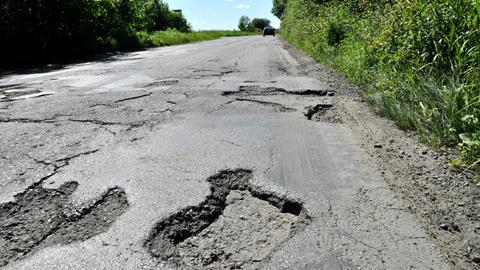The DfT is unaware of the state of English local roads and bridges and does not know how well councils are using funds to tackle potholes, according to a report published today by the National Audit Office (NAO).
The report reveals that the DfT decided to limit the data it collects on local roads to reduce its administrative burden and so “does not know” the impact of its funding for local roads maintenance, which totalled £1.1bn in the 2022/23 financial year.
The report states: ”There is no reporting requirement for unclassified roads, which make up 62% of the local network, although around 70% of local authorities provided these data in 2023. This means DfT does not hold information for much of the network.”
It adds: ”DfT does not collect data for footways or cycleways and has not collected data on bridge condition from local authorities since 2014, when it revised its data collection.
”A 2023 survey by industry found that on average 4% of bridges maintained by local authorities – totalling around 2,300 – were in substandard condition.”
As a result the report concluded that the limited data that DfT collects erroneously shows the surface condition of local roads as stable over time, but information from industry bodies, such as the Asphalt Industry Alliance, as well as from road users suggests that road condition is actually getting worse.
The report also found that the increasing backlog in road maintenance work is preventing local authorities undertaking preventative work that could deliver better value.
It also warned that the DfT needs to plan for how it will support local authorities to meet new challenges on the road network, such as climate change and the introduction of autonomous vehicles.
The NAO report makes a number of key recommendations to the DfT, including reviewing its reporting requirements for local road conditions; requesting information on other key road assets such as bridges; working with HM Treasury to set out how it will provide longer-term funding certainty to local authorities; consolidating the number of shorter-term funds through which local authorities receive funding for road maintenance; and take a rigorous approach to ensuring incentive funding is delivering real improvements.
Last year the Conservative government announced £8.3bn of extra funding over 11 years to fix potholes in England as part of its Network North strategy using money saved by scrapping the HS2 extension.
Pre-election, Labour committed to fund the fixing of an additional one million potholes across England each year, which would be paid for by deferring the A27 Arundel bypass in West Sussex.
The cost of repairing local roads in England and Wales is estimated to be £16.3bn.
David Giles, chair of the Asphalt Industry Alliance, said the NAO report held no surprises. “The results of the National Audit Office report clearly echo those of our Annual Local Authority Road Maintenance (ALARM) survey reports across the years and confirm what we already know – the condition of our local roads is now at an all-time low and there are significant challenges ahead if we are to see significant improvements.”
He added: “We stand by the calls made in our 2024 ALARM survey report for sustained, targeted and accountable funding for local roads, which are complementary to those NAO recommendations.”
However he warned: “Without clarity on how much money will be made available over the life of this Parliament, as well as an effective ring-fence mechanism, local authorities will be unable to carry out the proactive maintenance required to improve conditions for the benefit of all road users.”
Michelle Gardner, deputy director of policy at Logistics UK, commented: “The report makes sober reading and is a sad reflection on the state of disrepair of England’s roads. Potholes cost the UK’s economy over £14.4bn a year and there is now an opportunity for the new government to implement the report’s recommendations and repair the infrastructure relied on by businesses and the wider population every day.
“The NAO recommends that the DfT works with HM Treasury to set out how it will provide longer-term funding certainty to local authorities, and this, together with the current lack of accurate data on the condition of local roads, is something we are urging the new government to address as soon as possible.
”Long term funding will enable local authorities to implement preventative road maintenance which, as the NAO recognises, delivers better value for money for taxpayers, is more cost effective than reactive, short-term maintenance activity and will keep deliveries moving to support the UK’s economy.”
RAC head of policy Simon Williams called for swift action by the new government. He commented: “It’s bad enough that historically the government doesn’t really know just how bad our roads are. But it’s absolutely staggering that it doesn’t know whether the money it gives to councils has been used effectively. This has to change and we very much hope the new government acts fast to fix it.”
Local Government Association spokesperson Councillor Claire Holland, added: ”The new government should commit to maintain the previous administration’s spending plans for local highways maintenance, alongside the need for long-term funding certainty as recommended in this report, to help better support resurfacing schemes and prevent potholes in the first place.”
Responding to the report, the DfT said it is committed to tackling the poor state of the UK’s roads. A spokesperson added: “That’s why we’ve pledged to support local authorities to fix local pothole-ridden roads for the long term.”

















